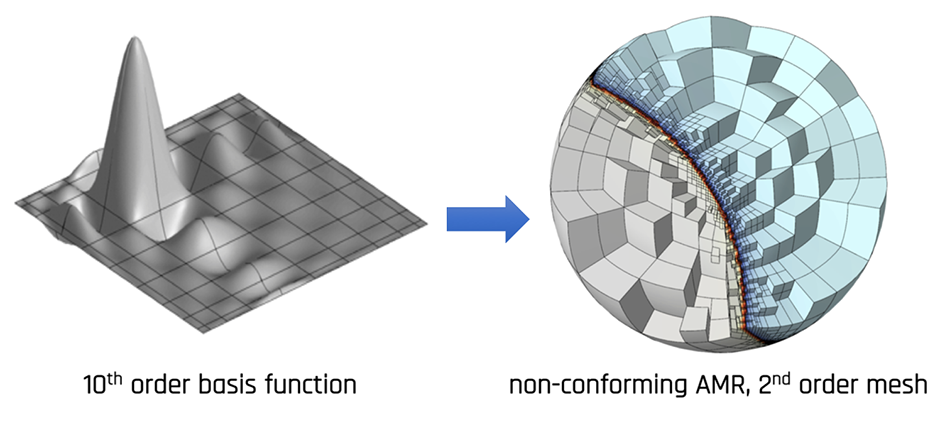
The Department of Energy’s Exascale Computing Project (ECP) Application Development focus area manages the ECP Co-Design Centers, which are loosely organized around scientific computing motifs, such as adaptive mesh refinement and particle methods. Working with the ECP applications projects, the goal of these centers is to accelerate the development of advanced, cross-cutting algorithmic techniques suitable for exascale computing. LLNL researchers participate in four ECP Co-Design Centers.
LLNL Led
Principal Investigator: David Richards, LLNL
The Proxy Apps project establishes, maintains, verifies, and extends as needed a full suite of proxies (small stand-alone applications designed to exercise specific communication, computation or data access patterns) relevant to ECP applications. Proxies will be used as an essential tool in co-design collaborations among the three ECP focus areas.
Principal Investigator: Tzanio Kolev, LLNL
Addressing the computational motif of unstructured mesh, spectral and high-order finite element (FE) methods, this center will develop FE discretization libraries to enable unstructured PDE-based applications to take full advantage of exascale resources without the need to “reinvent the wheel” of complicated FE machinery on coming exascale hardware. The focus is on high-order methods for high-fidelity and better performance, with a range of orders providing flexibility in uncertain hardware and software environments, on extending to problems with unstructured non-conforming mesh refinement and general curved meshes, and on including low-order FE discretizations. This center is a collaboration with ANL, UIUC, Virginia Tech, University of Colorado, University of Tennessee Knoxville, and Rensselaer Polytechnic Institute.
MFEM, Livermore's free, lightweight, scalable C++ library for finite element methods, is a major part of CEED.
Partner Led
Principal Investigator: Frank Alexander, BNL; Brian Van Essen, LLNL
ExaLearn is a co-design center for Exascale Machine Learning (ML) Technologies and is a collaboration initially consisting of experts from eight multipurpose DOE labs.
Rapid growth in the amount of data and computational power is driving a revolution in ML and artificial intelligence (AI). Beyond the highly visible successes in machine-based natural language translation, new ML technologies have profound implications for computational and experimental science and engineering and the exascale computing systems that DOE is deploying to support those disciplines. To address these challenges, the ExaLearn co-design center will provide exascale ML software for use by ECP Applications projects, other ECP Co-Design Centers, and DOE experimental facilities and leadership class computing facilities. The ExaLearn Co-Design Center will also collaborate with ECP PathForward vendors on the development of exascale ML software.
The practical end product will be a scalable and sustainable ML software framework that allows application scientists and the applied mathematics and computer science communities to engage in co-design for learning. The new knowledge and services to be provided by ExaLearn are imperative for the nation to remain competitive in computational science and engineering by making effective use of future exascale systems.
Principal Investigator: Tim Germann, LANL; James Belak, LLNL Lead
Serving as the centralized clearinghouse for particle-based methods (both particle-particle and particle-mesh interactions), this center will focus on four sub-motifs: short-range particle-particle (e.g., MD and SPH), long-range particle-particle (e.g., electrostatic and gravitational), particle-in-cell (PIC), and additional sparse matrix and graph operations of linear-scaling quantum MD. This center is a collaboration with LANL, SNL, ORNL, ANL, and PPPL.




